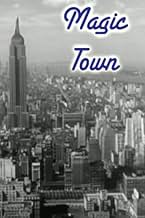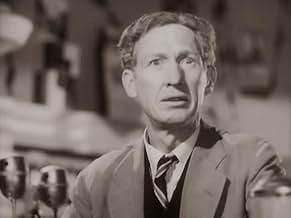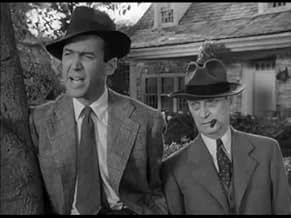IMDb रेटिंग
6.4/10
1.8 हज़ार
आपकी रेटिंग
अपनी भाषा में प्लॉट जोड़ेंAn opinion pollster finds a town which is a perfect mirror of U.S. opinions.An opinion pollster finds a town which is a perfect mirror of U.S. opinions.An opinion pollster finds a town which is a perfect mirror of U.S. opinions.
- पुरस्कार
- कुल 1 जीत
फ़ीचर्ड समीक्षाएं
Okay, I'll admit the plot is silly and contrived. Sure, the idea of an actuary determining that there is a "perfect" city that is actually statistically represents America in a microcosm is silly. And, their plan NOT to tell anyone in the town but surreptitiously poll just these townspeople in order to find out what America thinks about a wide variety of issues is far-fetched. BUT, with Jimmy Stewart and Jane Wyman as well as William Wellman's direction, who cares?! This is one of those "just sit back and enjoy" pictures that isn't particularly deep but that is charming and great fun to watch. And I think we need a few films like this now and again.
Stewart's previous movie was "It's a Wonderful Life", and this one drinks from the same well.
It has a strong underlying moral about being true to yourself, and extols the virtues of honesty, pride in your small-town community. The town appears to be a microcosm of America, but it can only be that while it still has its innocence: once it tries to cash in on its status, disaster strikes.
It's a gentle, heartwarming little movie. Jimmy Stewart and the then Mrs Reagan do the romantic lead bits, and lots of people with "interesting" faces play "typical small town characters", the children manage to avoid being ridiculously cute, and it's all quite charming.
Watch out for the Senator's wife and the ancient employees of the newspaper, who are the most obviously funny characters. This may be billed as a comedy, but it's one to be amused by, and brings smiles to you face rather than guffaws and belly-laughs.
If you liked James Stewart in "It's a Wonderful Life" and "The Philadelphia Story", this one's for you.
It has a strong underlying moral about being true to yourself, and extols the virtues of honesty, pride in your small-town community. The town appears to be a microcosm of America, but it can only be that while it still has its innocence: once it tries to cash in on its status, disaster strikes.
It's a gentle, heartwarming little movie. Jimmy Stewart and the then Mrs Reagan do the romantic lead bits, and lots of people with "interesting" faces play "typical small town characters", the children manage to avoid being ridiculously cute, and it's all quite charming.
Watch out for the Senator's wife and the ancient employees of the newspaper, who are the most obviously funny characters. This may be billed as a comedy, but it's one to be amused by, and brings smiles to you face rather than guffaws and belly-laughs.
If you liked James Stewart in "It's a Wonderful Life" and "The Philadelphia Story", this one's for you.
James Stewart stars as Rip Smith, a leading pioneer in the new sciences of public polling and demography. He discovers a small town that serves as a microcosm of the US, with the same percentages of men to women, farmers to shop-keepers, Democrats to Republicans, etc. Etc. This means that Rip and his two associates Ike (Ned Sparks) and Mr. Twiddle (Donald Meek) can survey this one town and get the same results as if they's polled the whole nation, saving companies vast amounts of time and money. However, to keep the townsfolk's answers honest, the trio of newcomers pose as insurance salesmen. Rip also falls for local gal Mary (Jane Wyman), but how will she and the others react when they learn the truth of why Rip's in town?
This was made during a time when the new advances in sociology, group psychology, and by extension Madison Avenue's advertising firms, were thought be on the pulse of the future of the nation. This kind of thinking could make for a thoughtful movie with the right script, but this isn't it. This is a traditional rom-com mixed with lukewarm social commentary and square citizenship lessons. Stewart and Wyman are both fine, as usual, and I liked seeing Ned Sparks, one of the busier character actors of the 1930's, acting wry and cynical again. This would be Sparks last film, as it would be for Harry Holman and Donald Meek, too. Director William Wellman keeps things moving quickly enough, but no one would consider this one of the better films by anyone involved.
This was made during a time when the new advances in sociology, group psychology, and by extension Madison Avenue's advertising firms, were thought be on the pulse of the future of the nation. This kind of thinking could make for a thoughtful movie with the right script, but this isn't it. This is a traditional rom-com mixed with lukewarm social commentary and square citizenship lessons. Stewart and Wyman are both fine, as usual, and I liked seeing Ned Sparks, one of the busier character actors of the 1930's, acting wry and cynical again. This would be Sparks last film, as it would be for Harry Holman and Donald Meek, too. Director William Wellman keeps things moving quickly enough, but no one would consider this one of the better films by anyone involved.
Certainly not one of the great comedies, but charming and rather whimsical in its own way. In this day and age of raucous and crude humour (if you can call it that), a movie like "Magic Town" will probably seem hopelessly old-fashioned and dated, but for those who prefer a quieter and more gentle humour, "Magic Town" will fill the bill very nicely. Very Frank Capra-like (not surprisingly since screenwriter Robert Riskin collaborated with Capra numerous times), "Magic Town" reminds us of a by-gone era, a time when living in a small town meant knowing your neighbours, pride in your community, and the moral values of common decency and humility were still part of everyday life. James Stewart as the pollster who discovers a town full of people whose opinions exactly mirror the national thinking gives his customary good performance, as does Jane Wyman as the newspaper publisher who wants to see change in the town. Many well-known character actors (Kent Smith, Wallace Ford, Ann Shoemaker and particularly Ned Sparks) provide capable support. A slight offering, perhaps, but quite worthwhile.
"Magic Town" is a film about something that we nowadays take as normal but which was a novelty in 1947. It was about the new "science" of public opinion polling. This was only understood poorly and not only by the public but by those who actually mattered: the politicians who would grow to need them. In 1936 the Literary Digest, a popular magazine of the day, had conducted a poll of it's membership on who would win the Presidency. It concluded that Governor Alfred Landon of Kansas, a capable man, would beat incumbent President Franklin Roosevelt. Unfortunately the readership of the Digest were upper class, and basically Republican (as Landon was). In November 1936 FDR won one of the biggest landslides in political history, with three quarters of the popular vote and all the electoral votes except for those of Maine and Vermont. Literary Digest went out of business shortly afterwords. In the decade since Roper and Gallup had been improving polling techniques, but the full system was still uncertain. In the 1948 election there would be another polling snafu, with most of the polls awarding the election to Governor Thomas Dewey of New York, as opposed to incumbent President Harry Truman. Harry won a remarkable come-from-behind over Tom, and enjoyed showing off a headline from the Republican "Chicago Tribune" saying that Tom won.
In the midst of all this there was a classic sociology study entitled "Middletown". Set in the typical mid-American town (it was in the Midwest) the authors (a husband and wife team) showed how it's citizens opinions mirrored what mid-America believed. Ten years later the same authors published a follow up study of the town, and it turned there was little change in the opinion differentials between the town and the country.
It is with the "Middletown" study that the background of this film was based. Jimmy Stewart and his assistants (including Ned Sparks and Donald Meek - in his last role) are pollsters, and Stewart has a theory he has been working on that would save pollsters millions. He believes there is a perfect community in the middle of America that can be used for polling it's citizens. He has been studying the problem for several years, and he has found a town where the percentages of the opinions of the citizens perfectly mirror those of the American people as a whole. Stewart goes to the town and sets up there with the intention of using the citizens as his poling guinea pigs, but (as the movie progresses) he gets involved with Jane Wyman and the others in the town. When Wyman discovers Stewart's plans she reveals them, and the town goes crazy. Their sudden unofficial power goes to their heads, and instead of giving the sensible polling answers to questions they give outlandish ones. This causes the crash of their reputation, and the crisis of the film.
It is a first rate film and has some nice touches (including Gabriel Heater intoning on the radio). As an early story regarding the polling industry it is unique, and the film is well acted and directed (by William Wellman). Perhaps not a Capra movie, but it is a nice one all the same.
In the midst of all this there was a classic sociology study entitled "Middletown". Set in the typical mid-American town (it was in the Midwest) the authors (a husband and wife team) showed how it's citizens opinions mirrored what mid-America believed. Ten years later the same authors published a follow up study of the town, and it turned there was little change in the opinion differentials between the town and the country.
It is with the "Middletown" study that the background of this film was based. Jimmy Stewart and his assistants (including Ned Sparks and Donald Meek - in his last role) are pollsters, and Stewart has a theory he has been working on that would save pollsters millions. He believes there is a perfect community in the middle of America that can be used for polling it's citizens. He has been studying the problem for several years, and he has found a town where the percentages of the opinions of the citizens perfectly mirror those of the American people as a whole. Stewart goes to the town and sets up there with the intention of using the citizens as his poling guinea pigs, but (as the movie progresses) he gets involved with Jane Wyman and the others in the town. When Wyman discovers Stewart's plans she reveals them, and the town goes crazy. Their sudden unofficial power goes to their heads, and instead of giving the sensible polling answers to questions they give outlandish ones. This causes the crash of their reputation, and the crisis of the film.
It is a first rate film and has some nice touches (including Gabriel Heater intoning on the radio). As an early story regarding the polling industry it is unique, and the film is well acted and directed (by William Wellman). Perhaps not a Capra movie, but it is a nice one all the same.
क्या आपको पता है
- गूफ़At the soda fountain, between shots, the drinks are full, then half empty, then full again.
- भाव
Mary Peterman: The air becomes charged with electricity around desperate men.
- इसके अलावा अन्य वर्जनAlso available in a colorized version.
टॉप पसंद
रेटिंग देने के लिए साइन-इन करें और वैयक्तिकृत सुझावों के लिए वॉचलिस्ट करें
- How long is Magic Town?Alexa द्वारा संचालित
विवरण
- चलने की अवधि1 घंटा 43 मिनट
- रंग
- पक्ष अनुपात
- 1.37 : 1
इस पेज में योगदान दें
किसी बदलाव का सुझाव दें या अनुपलब्ध कॉन्टेंट जोड़ें





































